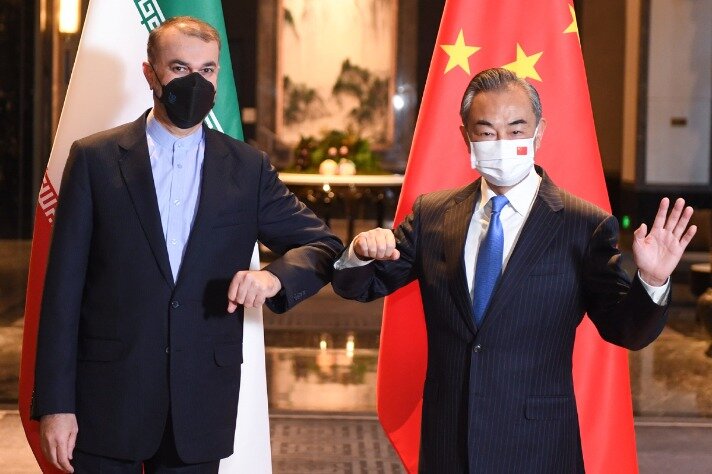Iran, China FMs discuss issues of common interest

TEHRAN- On Tuesday, Iran's Foreign Minister Hossein Amir Abdollahian spoke on phone with the Chinese State Councilor and Foreign Minister Wang Yi about bilateral relations as well as regional and international issues of mutual interest.
Iran's foreign minister said that if the U.S. is serious, a good and robust agreement on reviving the U.S.-abandoned Iran deal may be reached through the Vienna talks.
During the phone call, Amir Abdollahian briefed his Chinese counterpart on the latest developments in efforts to revive the Joint Comprehensive Plan of Action (JCPOA), commonly known as the Iran deal.
“If the American side is realistic, we will finalize a good, strong, and lasting agreement with the support of all negotiating parties in Vienna,” Amir Abdollahian said.
He stated that Iran is ready to return to the negotiating table as soon as possible to settle the remaining unresolved concerns through consultation with relevant parties in order to strike a good deal.
Iran expresses gratitude to China for its constructive engagement in the talks and expresses optimism that China would continue to give assistance.
“Iran is ready to resume the negotiations as soon as possible to resolve the final outstanding issues through consultation with other parties and strive for a good agreement,” Abdollahian told Wang, thanking Beijing “for its constructive role in the negotiations.”
He also mentioned his meeting with Russian Foreign Minister Sergei Lavrov, stating that the Russian side reaffirmed its support for the lifting of U.S. sanctions against the Islamic Republic by participating constructively in the Vienna talks.
Iran insists it wants assurances that the U.S. would not abandon the agreement again. It also wants that U.S. sanctions to be lifted in a verifiable way.
For his part, Wang stated that China has long supported achieving an agreement on restoring the JCPOA and is open to and supportive of efforts to this end.
“China is willing to strengthen coordination and cooperation with Iran to push the settlement of the Iran nuclear issue in a direction conducive to regional peace and stability,” the chief diplomat pointed out.
He went on to say that the Chinese side recognizes Iran's genuine concerns, supports Iran in protecting its legitimate rights and interests, and opposes unilateral sanctions that have no legal basis.
“China understands Iran’s legitimate concerns (and) supports Iran in safeguarding its legitimate rights and interests and opposes unilateral sanctions that have no basis in international law.” Wang asserted.
In reference to the continued growth of bilateral relations, the Chinese foreign minister stated that Beijing places a high value on expanding exchanges with Tehran and has no reservations about extending such relationships.
“In the face of the rapidly evolving international and regional situation, China is ready to strengthen coordination and cooperation with Iran to push for the resolution of the Iran nuclear issue in a direction conducive to regional peace and stability,” Wang said.
Amir Abdollahian also emphasized the importance of Tehran-Beijing relations and the necessity to strengthen them, stating that Iranian President Ebrahim Raisi's government prioritizes the development of ties.
China plans to host the summit of the foreign ministers of countries neighboring Afghanistan. It will be the third summit of its kind. Wang lauded Iran's foreign minister for accepting an invitation to participate in the meeting.
On Tuesday, Amir Abdollahian met with his Russian counterpart Lavrov in Moscow. Following the meeting, Iran's foreign minister stated that “Russia remains onboard for the final agreement in Vienna.”
The Iranian foreign minister visited Russia at a time that mainstream Western media outlets are speculating that Russia is impeding the conclusion of the negotiations in Vienna.
“I am tired of speculations regarding the Russian position at the final stage of the #ViennaTalks,” Russia’s lead negotiator Mikhail Ulyanov said via Twitter early on Wednesday. “Misunderstandings, misinterpretations, and distortion of realities. The bottom line: conclusion of the agreement depends not on Russia, but on others, especially #US.”
There is a moratorium on the talks in Vienna to allow negotiators to return to their respective capitals for more contacts to address a few unresolved concerns.
All sides to the talks have openly said that they are nearing the end of the process. Washington stated on Monday that the parties involved are “close to the finish line.” Iran has urged the U.S. to abandon its “excessive demands” in order to reach an agreement as soon as possible.
The United States unilaterally withdrew from the JCPOA in 2018 and launched a “maximum pressure” campaign of sanctions and intimidation against Iran. The Vienna talks seek to push the U.S. to completely respect the agreement by lifting all anti-Iran sanctions.
